Roberts A.D. The Cambridge History of Africa, Volume 7: from 1905 to 1940
Подождите немного. Документ загружается.

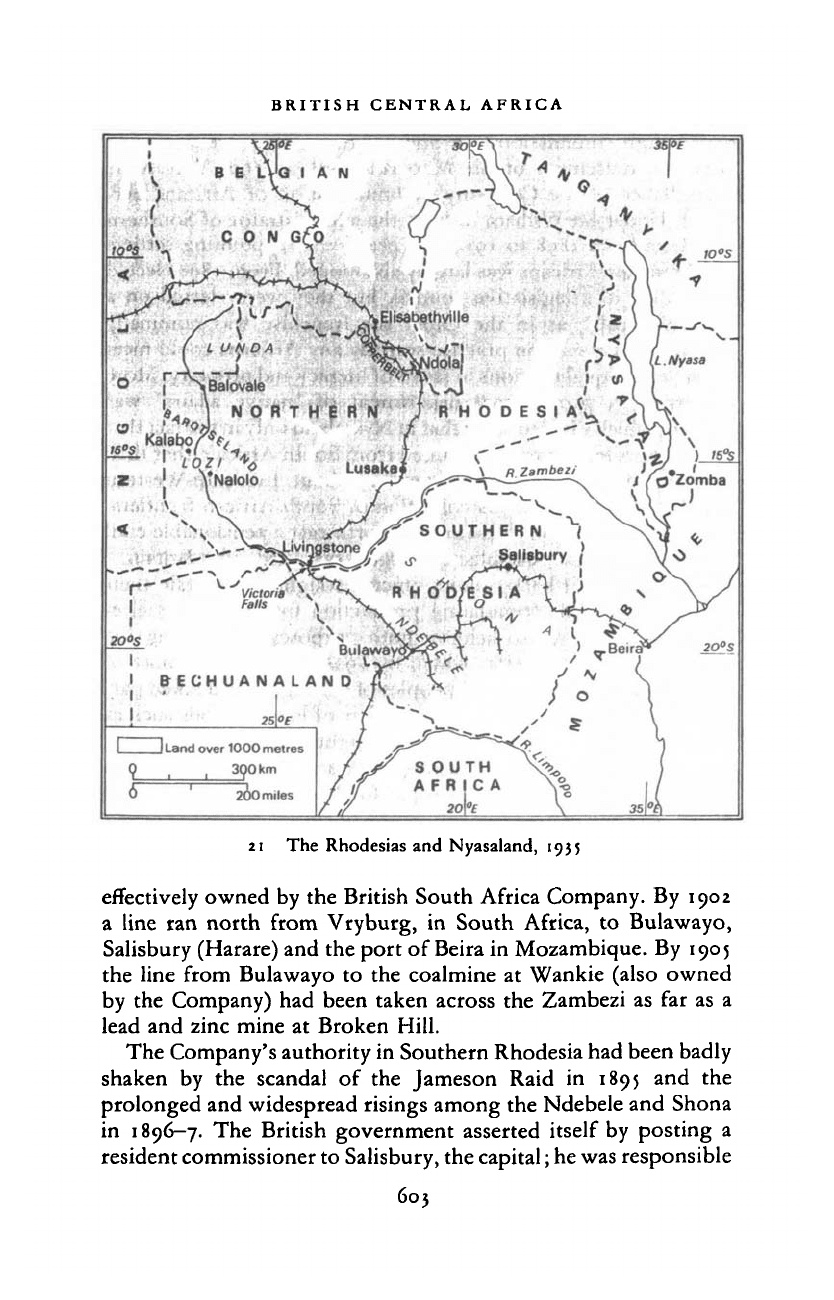
BRITISH CENTRAL AFRICA
I BECH UA N
A
L AN
D
21 The Rhodesias and Nyasaland, 1935
effectively owned by the British South Africa Company. By 1902
a line ran north from Vryburg,
in
South Africa,
to
Bulawayo,
Salisbury (Harare) and the port of Beira in Mozambique. By 1905
the line from Bulawayo to the coalmine at Wankie (also owned
by the Company) had been taken across the Zambezi as far as
a
lead and zinc mine at Broken Hill.
The Company's authority in Southern Rhodesia had been badly
shaken
by
the scandal
of
the Jameson Raid
in
1895 and
the
prolonged and widespread risings among the Ndebele and Shona
in 1896-7. The British government asserted itself by posting
a
resident commissioner to Salisbury, the capital; he was responsible
603
Cambridge Histories Online © Cambridge University Press, 2008
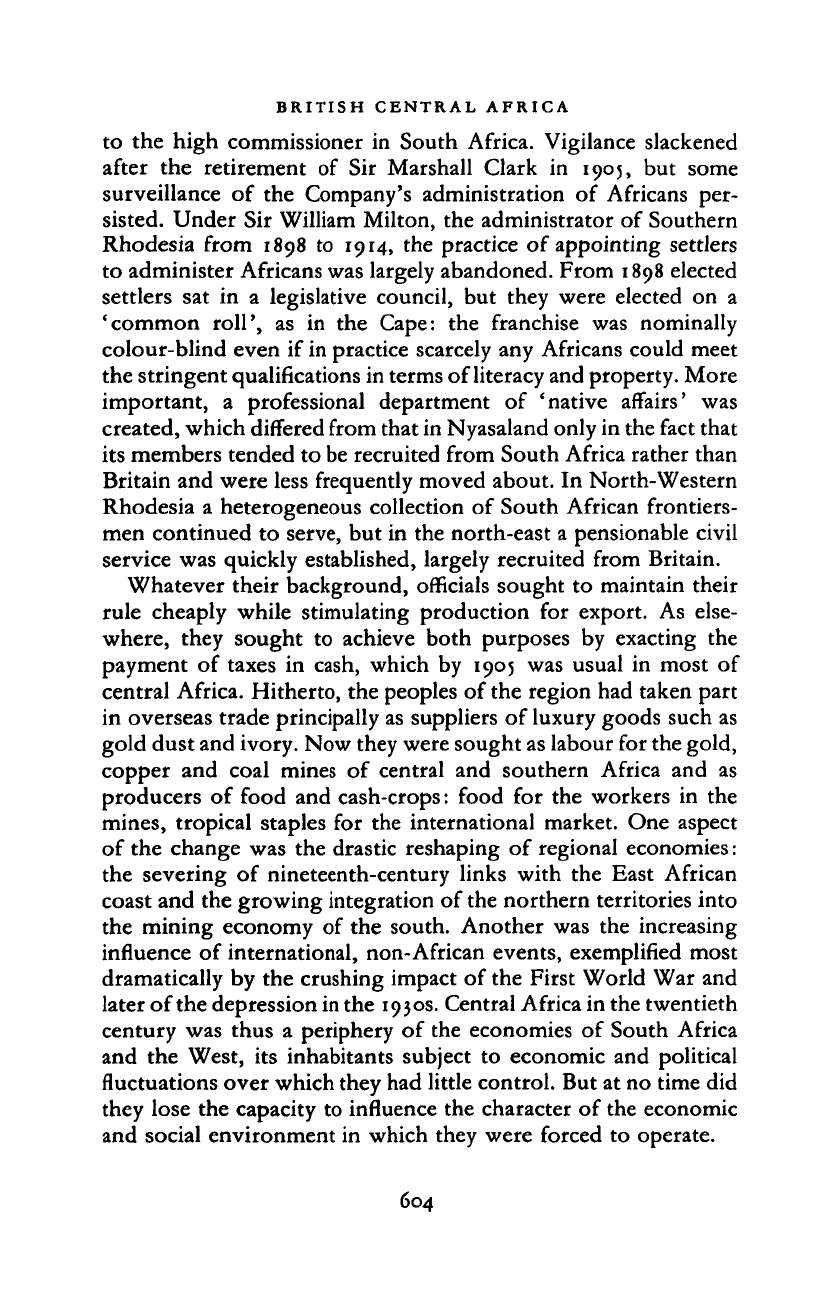
BRITISH CENTRAL AFRICA
to the high commissioner in South Africa. Vigilance slackened
after the retirement of Sir Marshall Clark in 1905, but some
surveillance of the Company's administration of Africans per-
sisted. Under Sir William Milton, the administrator of Southern
Rhodesia from 1898 to 1914, the practice of appointing settlers
to administer Africans was largely abandoned. From 1898 elected
settlers sat in a legislative council, but they were elected on a
'common roll', as in the Cape: the franchise was nominally
colour-blind even if in practice scarcely any Africans could meet
the stringent qualifications in terms of literacy and property. More
important, a professional department of 'native affairs' was
created, which differed from that in Nyasaland only in the fact that
its members tended to be recruited from South Africa rather than
Britain and were less frequently moved about. In North-Western
Rhodesia a heterogeneous collection of South African frontiers-
men continued to serve, but in the north-east a pensionable civil
service was quickly established, largely recruited from Britain.
Whatever their background, officials sought to maintain their
rule cheaply while stimulating production for export. As else-
where, they sought to achieve both purposes by exacting the
payment of taxes in cash, which by 1905 was usual in most of
central Africa. Hitherto, the peoples of the region had taken part
in overseas trade principally as suppliers of luxury goods such as
gold dust and ivory. Now they were sought as labour for the gold,
copper and coal mines of central and southern Africa and as
producers of food and cash-crops: food for the workers in the
mines, tropical staples for the international market. One aspect
of the change was the drastic reshaping of regional economies:
the severing of nineteenth-century links with the East African
coast and the growing integration of the northern territories into
the mining economy of the south. Another was the increasing
influence of international, non-African events, exemplified most
dramatically by the crushing impact of the First World War and
later of the depression in the 1930s. Central Africa in the twentieth
century was thus a periphery of the economies of South Africa
and the West, its inhabitants subject to economic and political
fluctuations over which they had little control. But at no time did
they lose the capacity to influence the character of the economic
and social environment in which they were forced to operate.
604
Cambridge Histories Online © Cambridge University Press, 2008
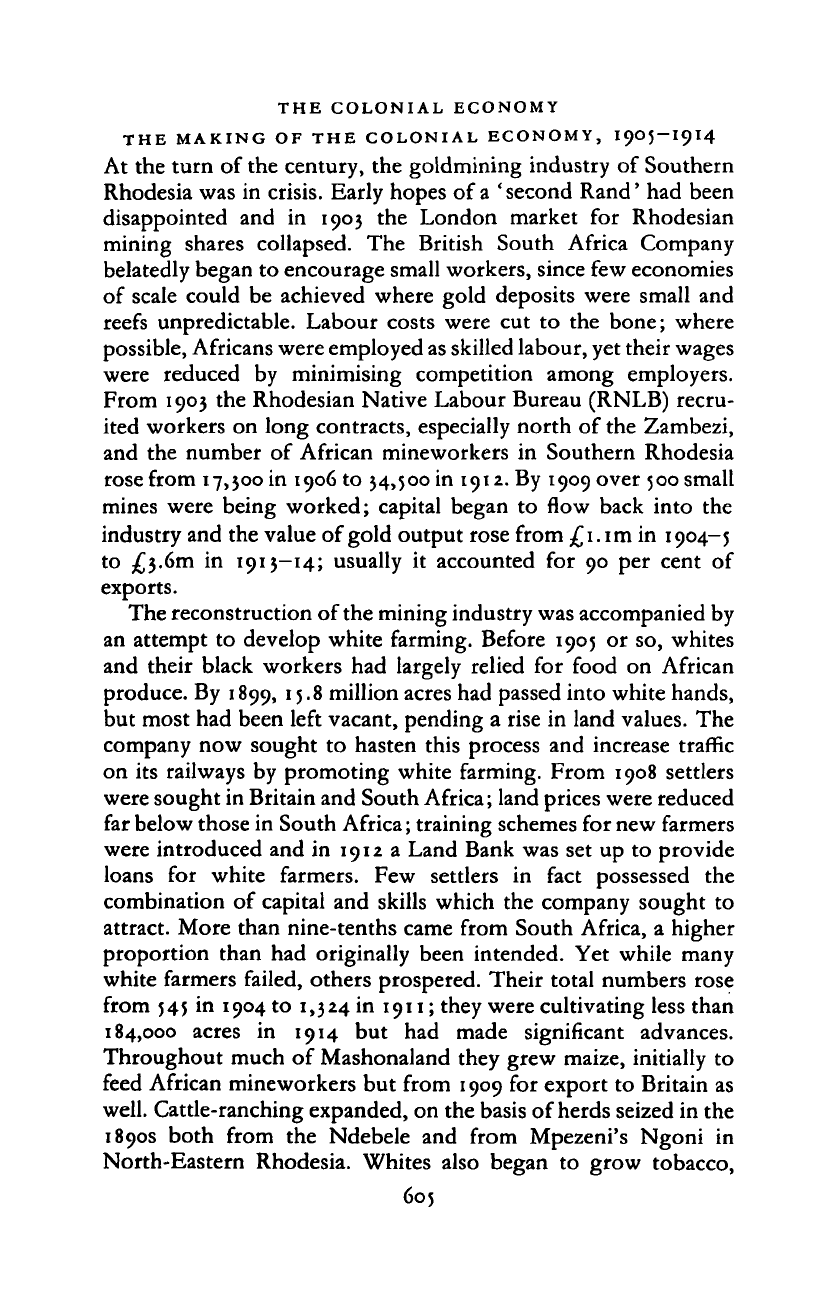
THE COLONIAL ECONOMY
THE MAKING OF THE COLONIAL ECONOMY, 1905-1914
At the turn of the century, the goldmining industry of Southern
Rhodesia was in crisis. Early hopes of
a
'second Rand' had been
disappointed and
in
1903
the
London market
for
Rhodesian
mining shares collapsed. The British South Africa Company
belatedly began to encourage small workers, since few economies
of scale could be achieved where gold deposits were small and
reefs unpredictable. Labour costs were cut
to
the bone; where
possible, Africans were employed as skilled labour, yet their wages
were reduced
by
minimising competition among employers.
From 1903 the Rhodesian Native Labour Bureau (RNLB) recru-
ited workers on long contracts, especially north of the Zambezi,
and the number
of
African mineworkers
in
Southern Rhodesia
rose from 17,300 in 1906 to 34,5 00 in
1912.
By 1909 over 5 00 small
mines were being worked; capital began
to
flow back into the
industry and the value of gold output rose from £1. im in 1904-5
to £3.6m
in
1913-14; usually
it
accounted
for
90 per cent
of
exports.
The reconstruction of the mining industry was accompanied by
an attempt to develop white farming. Before 1905 or so, whites
and their black workers had largely relied for food on African
produce. By 1899, 15.8 million acres had passed into white hands,
but most had been left vacant, pending a rise in land values. The
company now sought
to
hasten this process and increase traffic
on its railways by promoting white farming. From 1908 settlers
were sought in Britain and South Africa; land prices were reduced
far below those in South Africa; training schemes for new farmers
were introduced and in 1912 a Land Bank was set up to provide
loans
for
white farmers.
Few
settlers
in
fact possessed
the
combination of capital and skills which the company sought
to
attract. More than nine-tenths came from South Africa,
a
higher
proportion than had originally been intended. Yet while many
white farmers failed, others prospered. Their total numbers rose
from 545 in 1904 to 1,324 in
1911;
they were cultivating less than
184,000 acres
in
1914
but had
made significant advances.
Throughout much of Mashonaland they grew maize, initially
to
feed African mineworkers but from 1909 for export to Britain as
well. Cattle-ranching expanded, on the basis of herds seized in the
1890s both from
the
Ndebele and from Mpezeni's Ngoni
in
North-Eastern Rhodesia. Whites also began
to
grow tobacco,
605
Cambridge Histories Online © Cambridge University Press, 2008
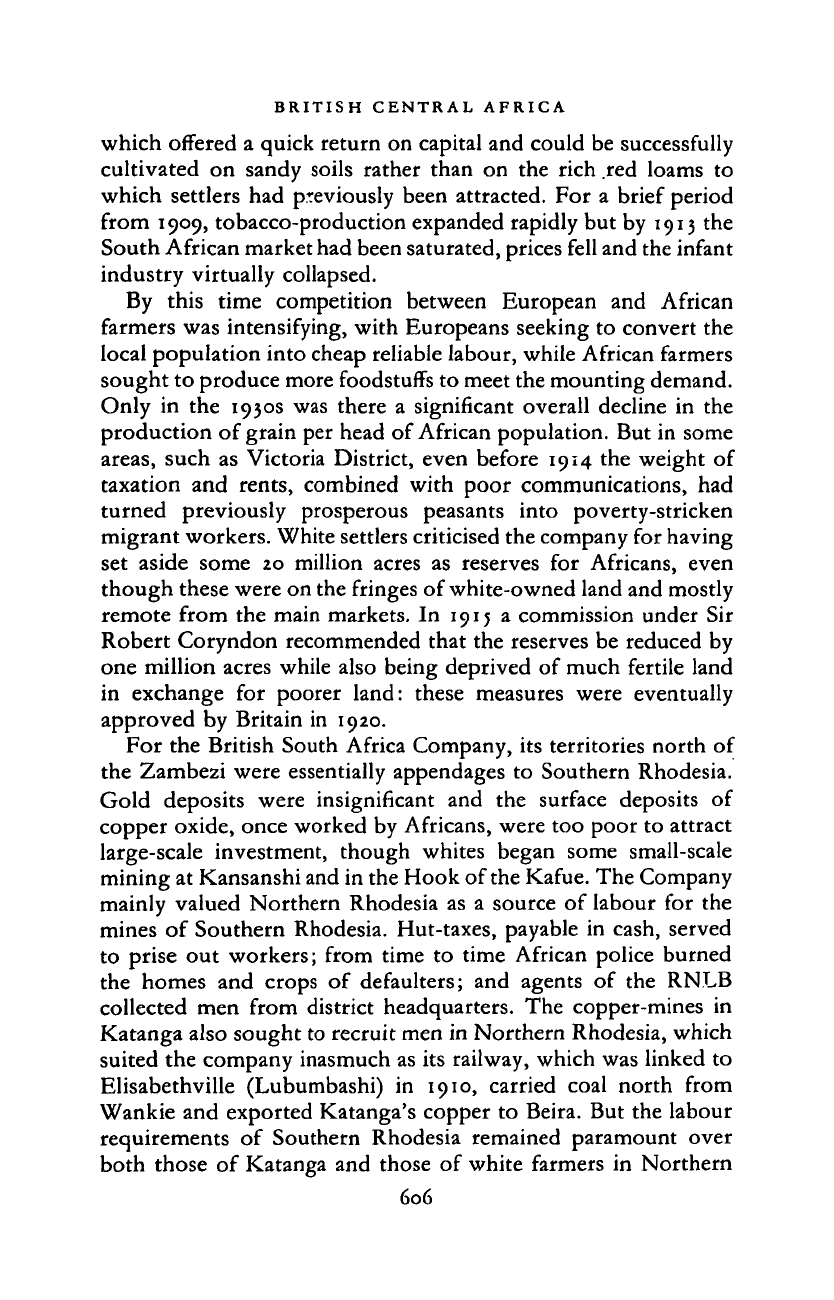
BRITISH CENTRAL AFRICA
which offered a quick return on capital and could be successfully
cultivated
on
sandy soils rather than on the rich .red loams
to
which settlers had previously been attracted. For
a
brief period
from 1909, tobacco-production expanded rapidly but by 1913 the
South African market had been saturated, prices fell and the infant
industry virtually collapsed.
By this time competition between European
and
African
farmers was intensifying, with Europeans seeking to convert the
local population into cheap reliable labour, while African farmers
sought to produce more foodstuffs to meet the mounting demand.
Only
in
the 1930s was there
a
significant overall decline
in
the
production of grain per head of African population. But in some
areas,
such as Victoria District, even before 1914 the weight of
taxation and rents, combined with poor communications, had
turned previously prosperous peasants into poverty-stricken
migrant workers. White settlers criticised the company for having
set aside some 20 million acres
as
reserves
for
Africans, even
though these were on the fringes of white-owned land and mostly
remote from the main markets.
In
1915
a
commission under Sir
Robert Coryndon recommended that the reserves be reduced by
one million acres while also being deprived of much fertile land
in exchange
for
poorer land: these measures were eventually
approved by Britain in 1920.
For the British South Africa Company, its territories north of
the Zambezi were essentially appendages to Southern Rhodesia.
Gold deposits were insignificant
and the
surface deposits
of
copper oxide, once worked by Africans, were too poor to attract
large-scale investment, though whites began some small-scale
mining at Kansanshi and in the Hook of the Kafue. The Company
mainly valued Northern Rhodesia as
a
source of labour for the
mines of Southern Rhodesia. Hut-taxes, payable in cash, served
to prise out workers; from time
to
time African police burned
the homes and crops
of
defaulters; and agents
of
the RNLB
collected men from district headquarters. The copper-mines
in
Katanga also sought to recruit men in Northern Rhodesia, which
suited the company inasmuch as its railway, which was linked to
Elisabethville (Lubumbashi)
in
1910, carried coal north from
Wankie and exported Katanga's copper to Beira. But the labour
requirements
of
Southern Rhodesia remained paramount over
both those of Katanga and those of white farmers
in
Northern
606
Cambridge Histories Online © Cambridge University Press, 2008
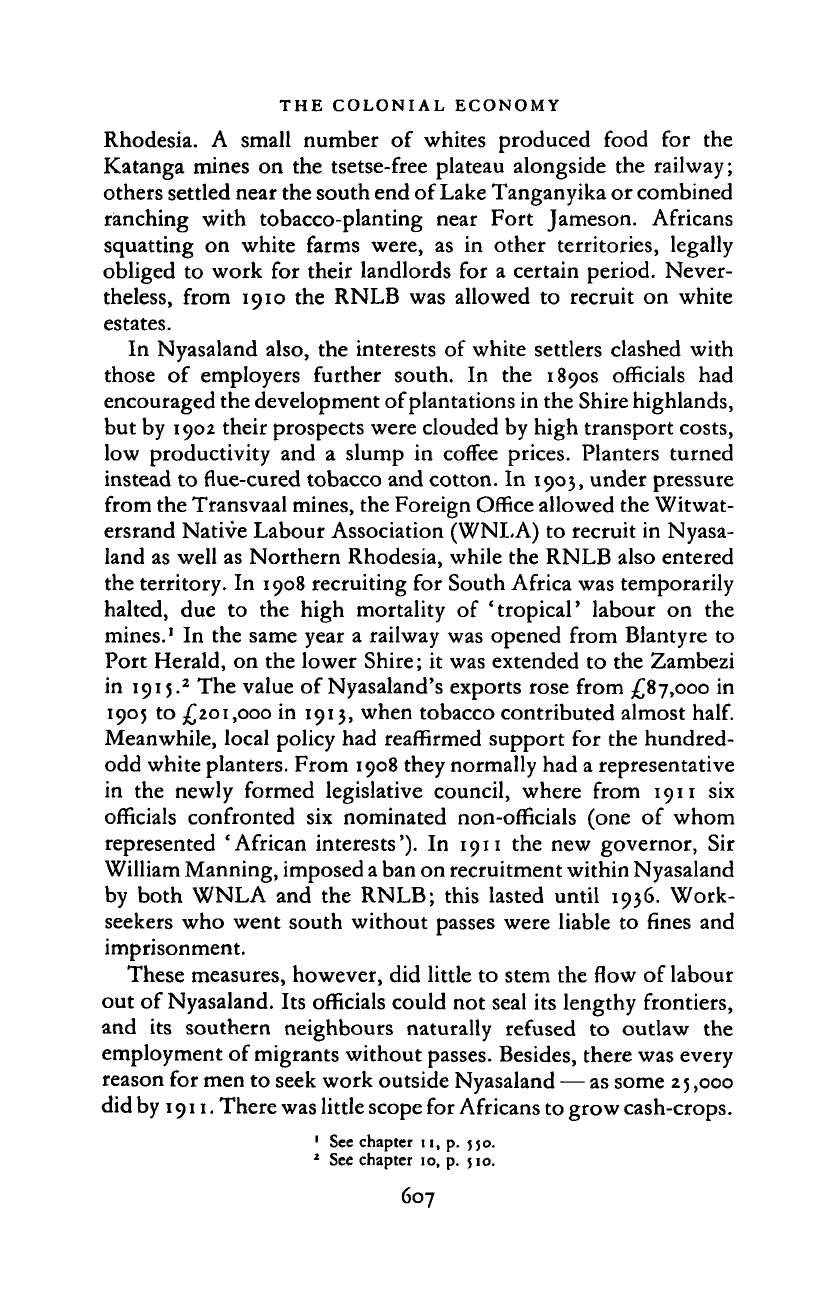
THE COLONIAL ECONOMY
Rhodesia.
A
small number
of
whites produced food
for the
Katanga mines
on
the tsetse-free plateau alongside the railway;
others settled near the south end of Lake Tanganyika or combined
ranching with tobacco-planting near Fort Jameson. Africans
squatting
on
white farms were,
as in
other territories, legally
obliged
to
work for their landlords for
a
certain period. Never-
theless, from 1910 the RNLB was allowed
to
recruit
on
white
estates.
In Nyasaland also, the interests of white settlers clashed with
those
of
employers further south.
In the
1890s officials
had
encouraged the development of plantations in the Shire highlands,
but by 1902 their prospects were clouded by high transport costs,
low productivity and
a
slump
in
coffee prices. Planters turned
instead to flue-cured tobacco and cotton. In 1903, under pressure
from the Transvaal mines, the Foreign Office allowed the Witwat-
ersrand Native Labour Association (WNLA) to recruit in Nyasa-
land as well as Northern Rhodesia, while the RNLB also entered
the territory. In 1908 recruiting for South Africa was temporarily
halted, due
to the
high mortality
of
'tropical' labour
on the
mines.
1
In the same year
a
railway was opened from Blantyre
to
Port Herald, on the lower Shire;
it
was extended to the Zambezi
in 1915.
2
The value of Nyasaland's exports rose from £87,000 in
1905 to £201,000 in 1913, when tobacco contributed almost
half.
Meanwhile, local policy had reaffirmed support for the hundred-
odd white planters. From 1908 they normally had a representative
in
the
newly formed legislative council, where from 1911
six
officials confronted six nominated non-officials (one
of
whom
represented 'African interests').
In
1911 the new governor,
Sir
William Manning, imposed
a
ban on recruitment within Nyasaland
by both WNLA and the RNLB; this lasted until 1936. Work-
seekers who went south without passes were liable
to
fines
and
imprisonment.
These measures, however, did little to stem the flow of labour
out of Nyasaland. Its officials could not seal its lengthy frontiers,
and
its
southern neighbours naturally refused
to
outlaw
the
employment of migrants without passes. Besides, there was every
reason for men to seek work outside Nyasaland — as some
2
5,000
did by
1911.
There
was
little scope for Africans to grow cash-crops.
1
Sec chapter
n,
p. 550.
2
See chapter 10, p. 510.
607
Cambridge Histories Online © Cambridge University Press, 2008
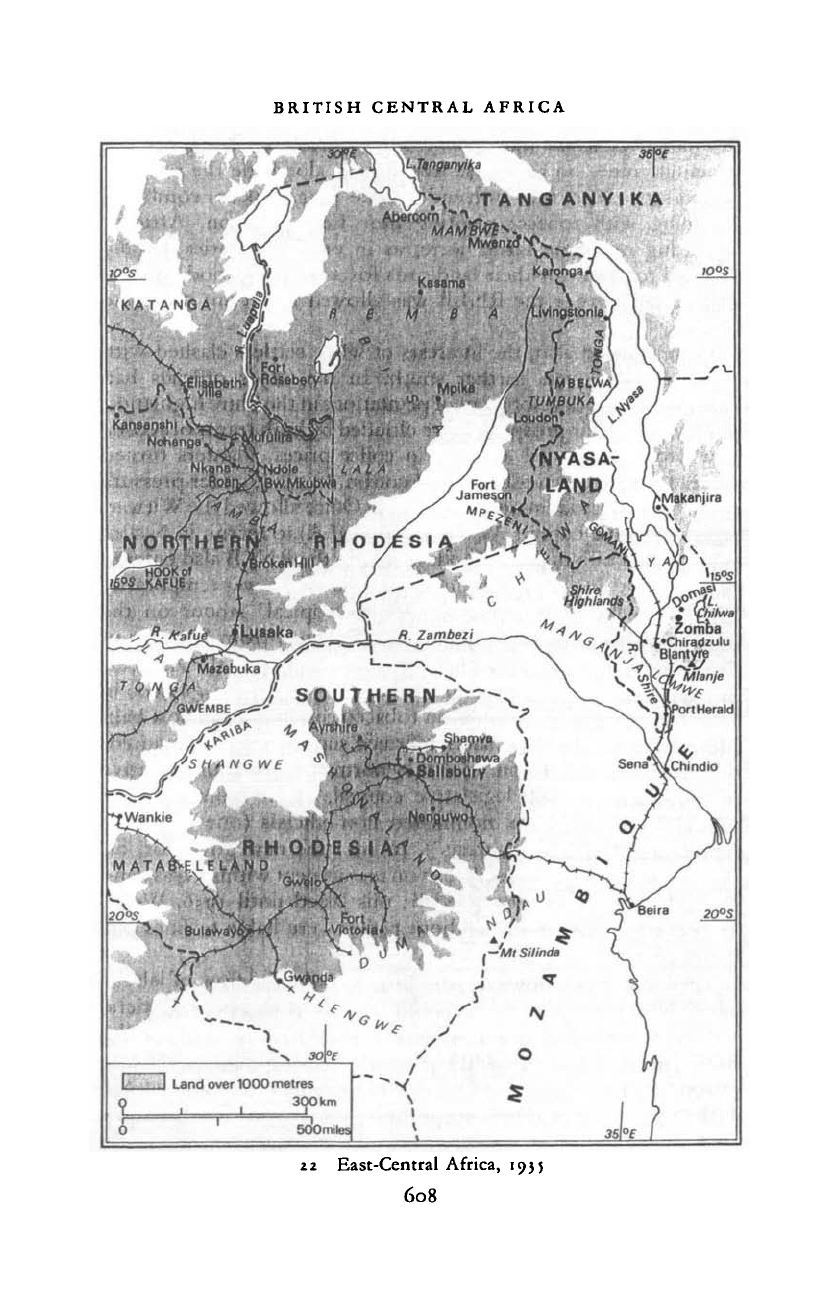
BRITISH CENTRAL AFRICA
l,fcXi..l
Land over 1000metres
O , 300 km
6 ' 5o\)miles
22 East-Central Africa, 1935
608
Cambridge Histories Online © Cambridge University Press, 2008
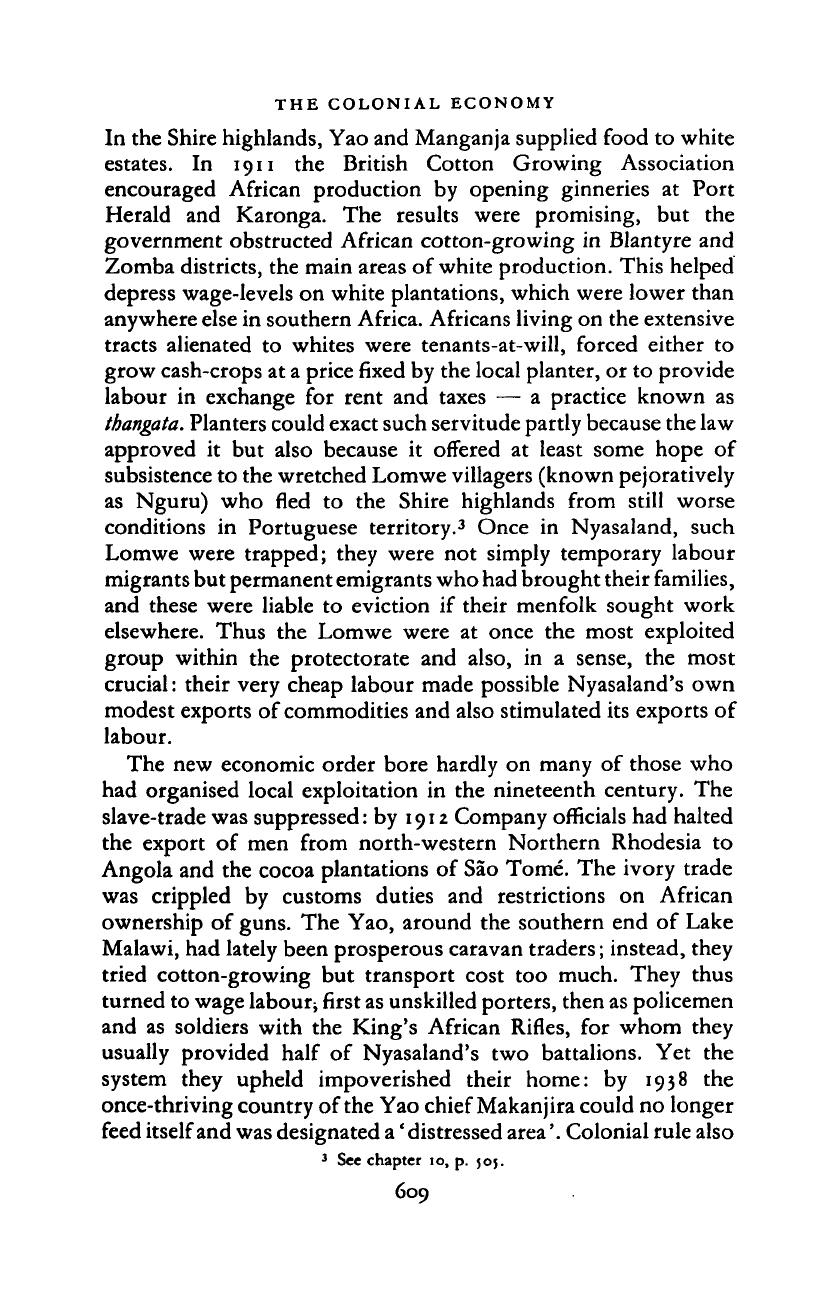
THE COLONIAL ECONOMY
In the Shire highlands, Yao and Manganja supplied food to white
estates.
In 1911 the
British Cotton Growing Association
encouraged African production
by
opening ginneries
at
Port
Herald
and
Karonga.
The
results were promising,
but the
government obstructed African cotton-growing in Blantyre and
Zomba districts, the main areas of white production. This helped
depress wage-levels on white plantations, which were lower than
anywhere else in southern Africa. Africans living on the extensive
tracts alienated
to
whites were tenants-at-will, forced either
to
grow cash-crops at a price fixed by the local planter, or to provide
labour
in
exchange
for
rent and taxes
— a
practice known
as
thangata.
Planters could exact such servitude partly because the law
approved
it but
also because
it
offered
at
least some hope
of
subsistence to the wretched Lomwe villagers (known pejoratively
as Nguru) who fled
to the
Shire highlands from still worse
conditions
in
Portuguese territory.
3
Once
in
Nyasaland, such
Lomwe were trapped; they were not simply temporary labour
migrants but permanent emigrants who had brought their families,
and these were liable
to
eviction
if
their menfolk sought work
elsewhere. Thus the Lomwe were
at
once the most exploited
group within
the
protectorate and also,
in a
sense,
the
most
crucial: their very cheap labour made possible Nyasaland's own
modest exports of commodities and also stimulated its exports of
labour.
The new economic order bore hardly on many
of
those who
had organised local exploitation
in
the nineteenth century. The
slave-trade was suppressed: by 1912 Company officials had halted
the export
of
men from north-western Northern Rhodesia
to
Angola and the cocoa plantations of Sao Tome. The ivory trade
was crippled
by
customs duties
and
restrictions
on
African
ownership of guns. The Yao, around the southern end
of
Lake
Malawi, had lately been prosperous caravan traders; instead, they
tried cotton-growing but transport cost too much. They thus
turned to wage labour; first as unskilled porters, then as policemen
and
as
soldiers with the King's African Rifles,
for
whom they
usually provided half
of
Nyasaland's
two
battalions.
Yet the
system they upheld impoverished their home:
by
1938
the
once-thriving country of the Yao chief Makanjira could no longer
feed itself and was designated a 'distressed area'. Colonial rule also
3
See chapter 10, p. 505.
609
Cambridge Histories Online © Cambridge University Press, 2008
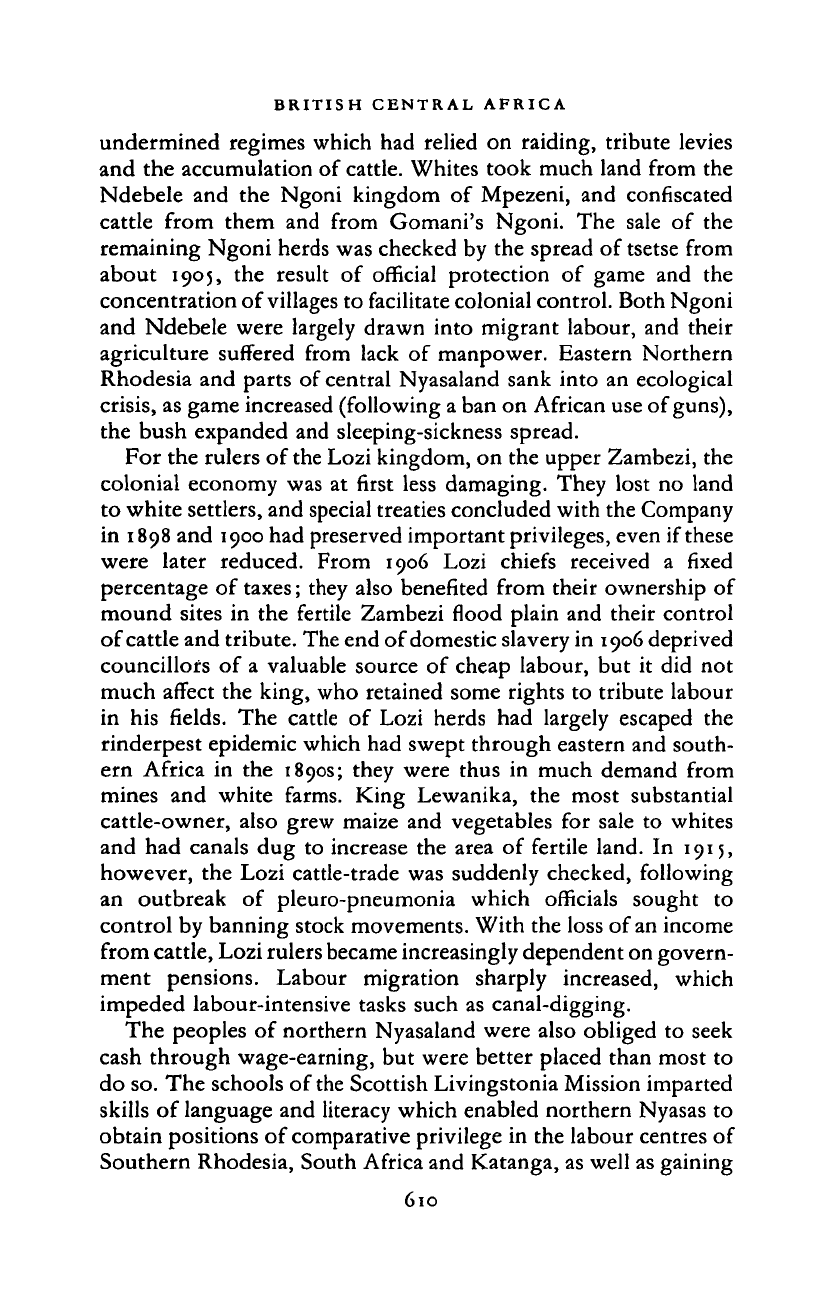
BRITISH CENTRAL AFRICA
undermined regimes which had relied on raiding, tribute levies
and the accumulation of cattle. Whites took much land from the
Ndebele and the Ngoni kingdom
of
Mpezeni, and confiscated
cattle from them and from Gomani's Ngoni. The sale
of
the
remaining Ngoni herds was checked by the spread of tsetse from
about 1905,
the
result
of
official protection
of
game and
the
concentration of villages to facilitate colonial control. Both Ngoni
and Ndebele were largely drawn into migrant labour, and their
agriculture suffered from lack
of
manpower. Eastern Northern
Rhodesia and parts of central Nyasaland sank into an ecological
crisis,
as game increased (following a ban on African use of
guns),
the bush expanded and sleeping-sickness spread.
For the rulers of
the
Lozi kingdom, on the upper Zambezi, the
colonial economy was at first less damaging. They lost no land
to white settlers, and special treaties concluded with the Company
in 1898 and 1900 had preserved important privileges, even if these
were later reduced. From 1906 Lozi chiefs received
a
fixed
percentage of taxes; they also benefited from their ownership of
mound sites in the fertile Zambezi flood plain and their control
of cattle and tribute. The end of domestic slavery in 1906 deprived
councillors of a valuable source of cheap labour, but
it
did not
much affect the king, who retained some rights to tribute labour
in his fields. The cattle
of
Lozi herds had largely escaped the
rinderpest epidemic which had swept through eastern and south-
ern Africa
in
the 1890s; they were thus
in
much demand from
mines and white farms. King Lewanika, the most substantial
cattle-owner, also grew maize and vegetables for sale to whites
and had canals dug to increase the area of fertile land.
In
1915,
however, the Lozi cattle-trade was suddenly checked, following
an outbreak
of
pleuro-pneumonia which officials sought
to
control by banning stock movements. With the loss of an income
from cattle, Lozi rulers became increasingly dependent on govern-
ment pensions. Labour migration sharply increased, which
impeded labour-intensive tasks such as canal-digging.
The peoples of northern Nyasaland were also obliged to seek
cash through wage-earning, but were better placed than most to
do so. The schools of
the
Scottish Livingstonia Mission imparted
skills of language and literacy which enabled northern Nyasas to
obtain positions of comparative privilege in the labour centres of
Southern Rhodesia, South Africa and Katanga, as well as gaining
610
Cambridge Histories Online © Cambridge University Press, 2008
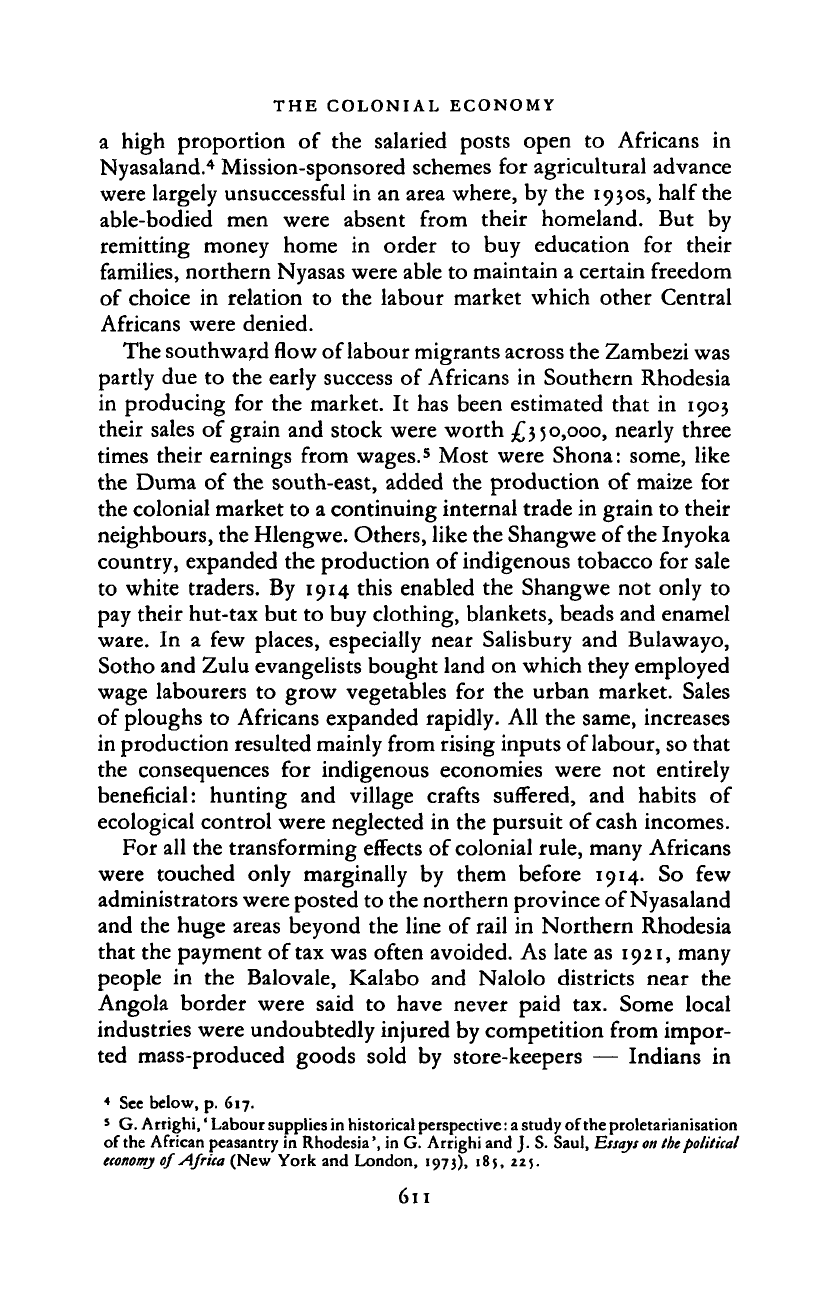
THE COLONIAL ECONOMY
a high proportion of the salaried posts open to Africans in
Nyasaland.
4
Mission-sponsored schemes for agricultural advance
were largely unsuccessful in an area where, by the 1930s, half the
able-bodied men were absent from their homeland. But by
remitting money home in order to buy education for their
families, northern Nyasas were able to maintain a certain freedom
of choice in relation to the labour market which other Central
Africans were denied.
The southward flow of labour migrants across the Zambezi was
partly due to the early success of Africans in Southern Rhodesia
in producing for the market. It has been estimated that in 1903
their sales of grain and stock were worth £350,000, nearly three
times their earnings from wages.
5
Most were Shona: some, like
the Duma of the south-east, added the production of maize for
the colonial market to a continuing internal trade in grain to their
neighbours, the Hlengwe. Others, like the Shangwe of the Inyoka
country, expanded the production of indigenous tobacco for sale
to white traders. By 1914 this enabled the Shangwe not only to
pay their hut-tax but to buy clothing, blankets, beads and enamel
ware. In a few places, especially near Salisbury and Bulawayo,
Sotho and Zulu evangelists bought land on which they employed
wage labourers to grow vegetables for the urban market. Sales
of ploughs to Africans expanded rapidly. All the same, increases
in production resulted mainly from rising inputs of labour, so that
the consequences for indigenous economies were not entirely
beneficial: hunting and village crafts suffered, and habits of
ecological control were neglected in the pursuit of cash incomes.
For all the transforming effects of colonial rule, many Africans
were touched only marginally by them before 1914. So few
administrators were posted to the northern province of Nyasaland
and the huge areas beyond the line of rail in Northern Rhodesia
that the payment of tax was often avoided. As late as 1921, many
people in the Balovale, Kalabo and Nalolo districts near the
Angola border were said to have never paid tax. Some local
industries were undoubtedly injured by competition from impor-
ted mass-produced goods sold by store-keepers — Indians in
4
Sec below, p. 617.
5
G. Arrighi,' Labour supplies in historical
perspective:
a
study of the proletarianisation
of the African peasantry in Rhodesia', in G. Arrighi and J. S. Saul,
Essays on
the political
economy
of Africa (New York and London, 1973), 185, 225.
Cambridge Histories Online © Cambridge University Press, 2008
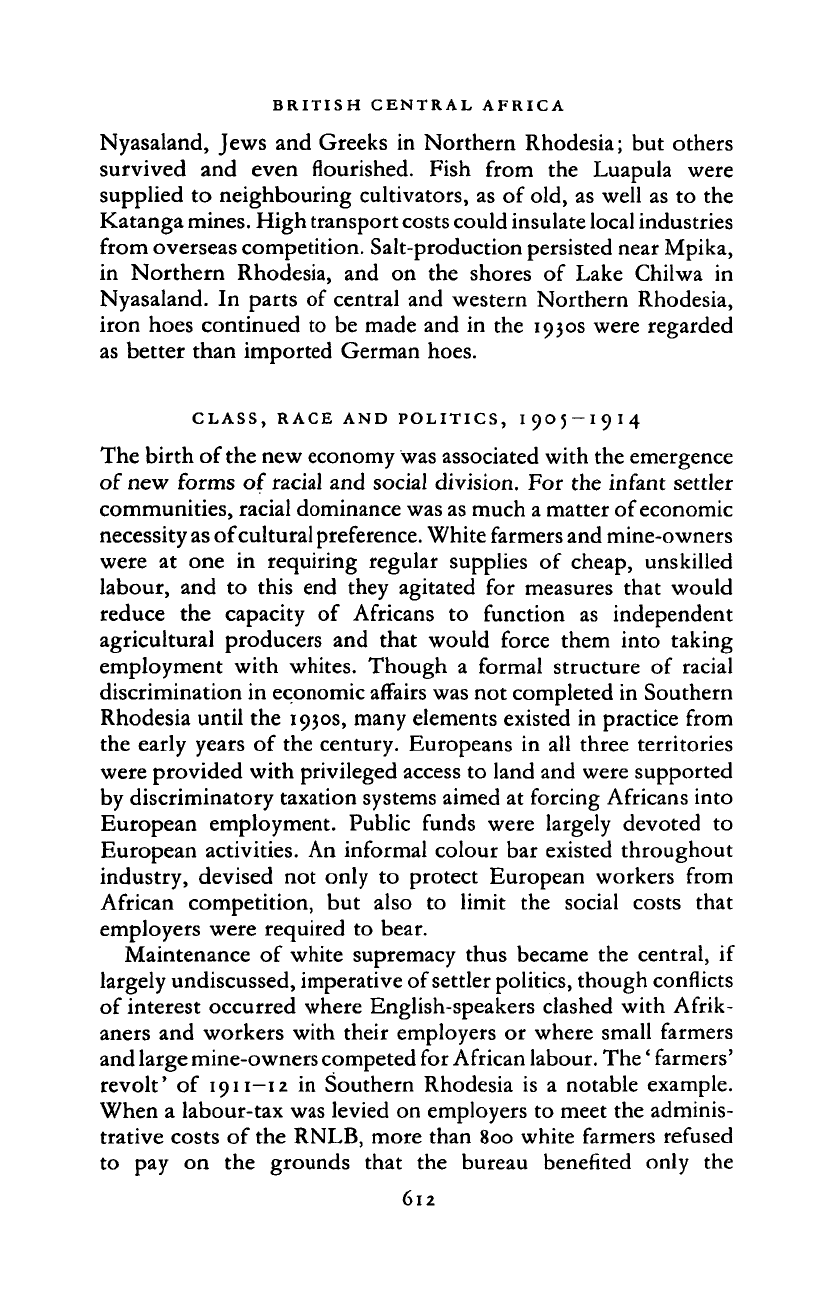
BRITISH CENTRAL AFRICA
Nyasaland, Jews and Greeks
in
Northern Rhodesia; but others
survived
and
even flourished. Fish from
the
Luapula were
supplied to neighbouring cultivators, as of old, as well as to the
Katanga
mines.
High transport costs could insulate local industries
from overseas competition. Salt-production persisted near Mpika,
in Northern Rhodesia, and
on
the shores
of
Lake Chilwa
in
Nyasaland.
In
parts of central and western Northern Rhodesia,
iron hoes continued to be made and in the 1930s were regarded
as better than imported German hoes.
CLASS, RACE
AND
POLITICS, 1905 —1914
The birth of the new economy was associated with the emergence
of new forms of racial and social division. For the infant settler
communities, racial dominance was as much a matter of economic
necessity
as
of cultural preference. White farmers and mine-owners
were
at
one
in
requiring regular supplies
of
cheap, unskilled
labour, and
to
this end they agitated
for
measures that would
reduce
the
capacity
of
Africans
to
function
as
independent
agricultural producers and that would force them into taking
employment with whites. Though
a
formal structure
of
racial
discrimination in economic affairs was not completed in Southern
Rhodesia until the 1930s, many elements existed in practice from
the early years of the century. Europeans in all three territories
were provided with privileged access to land and were supported
by discriminatory taxation systems aimed at forcing Africans into
European employment. Public funds were largely devoted
to
European activities. An informal colour bar existed throughout
industry, devised not only
to
protect European workers from
African competition,
but
also
to
limit
the
social costs that
employers were required to bear.
Maintenance
of
white supremacy thus became the central,
if
largely undiscussed, imperative of settler politics, though conflicts
of interest occurred where English-speakers clashed with Afrik-
aners and workers with their employers or where small farmers
and large mine-owners competed for African labour. The' farmers'
revolt'
of
1911—12
in
Southern Rhodesia is
a
notable example.
When a labour-tax was levied on employers to meet the adminis-
trative costs of the RNLB, more than 800 white farmers refused
to
pay on the
grounds that
the
bureau benefited only
the
612
Cambridge Histories Online © Cambridge University Press, 2008
